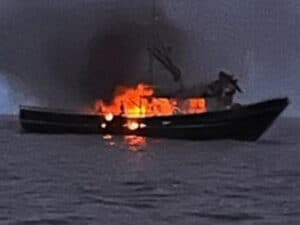
BIMCO starts work on new WINDSEACON contract for offshore wind market
Written by Nick Blenkey
Stinne Taiger Ivø, deputy secretary general at BIMCO: “There is a need for a targeted, balanced and commercially viable standard contractual framework for the offshore wind industry.” [Photo: BIMCO]
BIMCO has established a subcommittee to work on WINDSEACON, a global standard contract for the transport and installation of offshore wind turbines. The project has been launched to support the offshore wind industry as the global demand for more renewable sources of energy increases.
Work on the contract, WINDSEACON, was initiated through a series of consultations with about 65 key market players. Following consultation, a dedicated subcommittee and a large sounding board composed of a broad range of industry leaders from companies around the world has been established.
“During our consultations with offshore wind experts, it became evident that the majority of the market was using contracts reflecting a blend of construction contracts and BIMCO’s SUPPLYTIME charter party. The consultations confirmed that there is a need for a targeted, balanced and commercially viable standard contractual framework for the offshore wind industry,” says Stinne Taiger Ivø, deputy secretary general at BIMCO, heading contracts & clauses and support & advice.
The project focuses on tackling the challenges faced by the offshore wind industry, ensuring flexibility in the contractual framework, and keeping pace with the industry’s continuous evolution. BIMCO says that the WINDSEACON contract will provide the framework to make legal and commercial negotiations more effective and efficient, and the subcommittee is currently focusing on the transportation and installation aspects of offshore wind turbines.
As the work progresses, the subcommittee plans to consult and obtain feedback from the sounding board. The subcommittee will also explore whether additional U.S.-specific provisions are needed, as the U.S. market has different requirements than Europe and Asia when it comes to offshore wind turbines.
“The drafting team will bring their collective expertise to the table to develop a new standard contract that will help shape the future of offshore wind. The need for a targeted contract is growing and we are working on how it should be constructed to support the demand for renewable energy sources,” says Ivø.




